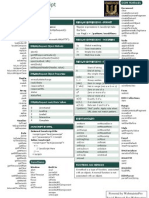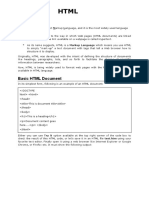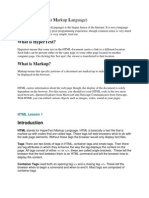Thirty Javascript Methods - The Cheat Sheet: Type Parameters Method
Uploaded by
Nobin ahmedThirty Javascript Methods - The Cheat Sheet: Type Parameters Method
Uploaded by
Nobin ahmedoptional
Thirty JavaScript Methods - The Cheat Sheet required
METHOD TYPE PARAMETERS DEFINITION
slice() A (start, end) extracts section of an array and returns a new array
reverse() A none reverses the order of an array
join() A (separator) joins elements of an array & returns a string
shift() A none removes first element of array, and returns that element
unshift() A (element1, element2.......) adds new items to the front of array, and returns new length
pop() A none removes last element of array, and returns that element
push() A (element1, element2.......) adds new items to the end of array, and returns new length
forEach() A function(element, index, arr) executes function once for each array element (returns nothing)
filter() A function(element, index, arr) creates a new array that contains all the values for which the
callback function returns true
map() function(element, index, arr) executes function once for each array element (returns a new,
A transformed array)
reduce() A function(acc, element, index, executes a function for each value of the array, from left to right,
arr), initialValue and reduces the array to a single value
reduceRight() function(acc, element, index, executes a function for each value of the array, from right to left,
A arr), initialValue and reduces the array to a single value
split() S (separator, limit) splits a string into array of substrings
slice() S (start, end) extracts section of a string and returns it as a new string
non-inclusive
substring() S (start, end) the same as slice(), but can't accept negative values
substr() (start, length) extracts parts of a string beginning at character of specified
S position, & returns the specified number of characters.
charAt() S (index) returns the character at specified index of string
indexOf() (searchvalue, startingIndex) returns the position of the first occurrence of a specified value
S in a string.
lastIndexOf() (searchvalue, startingIndex) returns the position of the last occurrence of a specified value
S in a string.
String() (object) converts the value of an object to a string
toString() N (radix) converts a number to a string
toFixed() N (x) converts number into string, keeping a specified number
of decimals (x)
Number() (object) converts the value of an object to a number
parseFloat() N (string) parses a string and returns a number
parseInt() N (string, radix) parses a string and returns a whole number
Math.round() N (x) returns the value of a number (x) rounded to the nearest integer
Math.ceil() N (x) returns a value (x) rounded up to its nearest integer
Math.floor() N (x) returns a value (x) rounded down to its nearest integer
Math.min() N (num1, num2, num3,......) returns the number with the lower value
Math.max() N (num1, num2, num3,......) returns the number with the highest value
You might also like
- Writing A Scholarship-Awarding Motivation Letter - by Fakrul Islam Tushar - Dec, 2020 - MediumNo ratings yetWriting A Scholarship-Awarding Motivation Letter - by Fakrul Islam Tushar - Dec, 2020 - Medium6 pages
- Javascript Object Methods Cheat Sheet: by ViaNo ratings yetJavascript Object Methods Cheat Sheet: by Via1 page
- Introduction To Javascript What Is Javascript?No ratings yetIntroduction To Javascript What Is Javascript?30 pages
- Ultimate Javascript Cheat Sheet - 200+ ResourcesNo ratings yetUltimate Javascript Cheat Sheet - 200+ Resources27 pages
- Next - Js 14 Unleashed - A Comprehensive Cheat Sheet For Modern Web Development - by Yuvraj Kakkar - Nov, 2023 - MediumNo ratings yetNext - Js 14 Unleashed - A Comprehensive Cheat Sheet For Modern Web Development - by Yuvraj Kakkar - Nov, 2023 - Medium5 pages
- JavaScript Programming - A Step-by-Step Guide For Absolute BeginnersNo ratings yetJavaScript Programming - A Step-by-Step Guide For Absolute Beginners149 pages
- JavaScript Fundamentals - Intro To JavaScript For APIs Cheatsheet - CodecademyNo ratings yetJavaScript Fundamentals - Intro To JavaScript For APIs Cheatsheet - Codecademy5 pages
- The Web Developer Bootcamp Outline (BA) - 2018-05-29No ratings yetThe Web Developer Bootcamp Outline (BA) - 2018-05-2979 pages
- HTML Cheat Sheet: A List of Common HTML Codes and Their PurposeNo ratings yetHTML Cheat Sheet: A List of Common HTML Codes and Their Purpose4 pages
- Coding With JavaScript For Dummies Everything To Know About JavaScript (2020) - 40153100% (1)Coding With JavaScript For Dummies Everything To Know About JavaScript (2020) - 40153247 pages
- Bootstrap Cheat Sheet: If You Plan To Pick Up Some Coding Skills, Bootstrap 4 Is A Solid Choice!100% (2)Bootstrap Cheat Sheet: If You Plan To Pick Up Some Coding Skills, Bootstrap 4 Is A Solid Choice!50 pages
- Python programming: A Quick and Easy Approach to Learning Python ProgrammingFrom EverandPython programming: A Quick and Easy Approach to Learning Python ProgrammingNo ratings yet
- funkcje_tablice_do_wypeÅnienia_Jakub_BenramdaneNo ratings yetfunkcje_tablice_do_wypeÅnienia_Jakub_Benramdane12 pages
- Food and Beverage Services 9 Quarter 1 Module 5No ratings yetFood and Beverage Services 9 Quarter 1 Module 515 pages
- Persidangan Pengarah2 Perhutanan SM 5 Sept 2022 - 220905 - 133501No ratings yetPersidangan Pengarah2 Perhutanan SM 5 Sept 2022 - 220905 - 13350116 pages
- E-C.2.4-HQ-PRO-001 Process and Mechanical Valving and Isolation Philosophy100% (2)E-C.2.4-HQ-PRO-001 Process and Mechanical Valving and Isolation Philosophy16 pages
- Cutout Templates For Panelview 5510 Terminals: 7-In. Touch Only 207 MM (8.15 In.) 6.5-In. Touch Only 184 MM (7.24 In.)No ratings yetCutout Templates For Panelview 5510 Terminals: 7-In. Touch Only 207 MM (8.15 In.) 6.5-In. Touch Only 184 MM (7.24 In.)2 pages
- School of Electrical and Computer Engineering: Project Title: Planar Array AntennaNo ratings yetSchool of Electrical and Computer Engineering: Project Title: Planar Array Antenna32 pages
- Check Point Remote Access RSA SecurID Access ClientNo ratings yetCheck Point Remote Access RSA SecurID Access Client15 pages
- Personal Information: Replace With First Name(s) Surname(s)100% (1)Personal Information: Replace With First Name(s) Surname(s)1 page
- Best Digital Marketing Courses in DelhiNo ratings yetBest Digital Marketing Courses in Delhi2 pages
- Power Your Signal: Antenna SpecificationsNo ratings yetPower Your Signal: Antenna Specifications3 pages

































































































